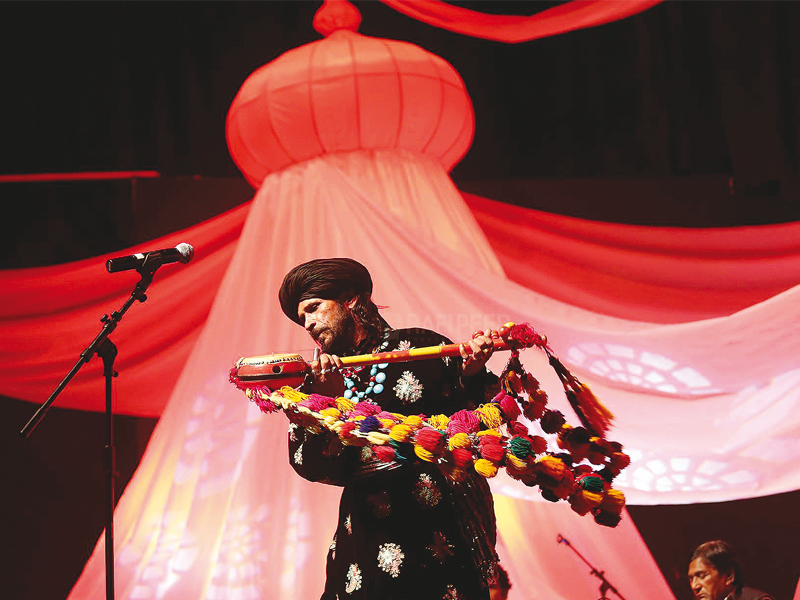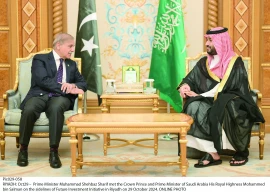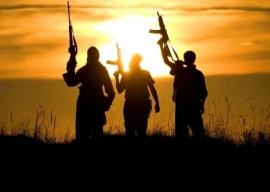
Of all the forms of devotional music, Sufi music, despite being age-old, has the ability to appeal to modern sensibilities. It encapsulates a facet of Eastern spirituality that can entrance anyone with its message of love. Celebrating this unparalleled, mystical magic of Sufi kalam, Rafi Peer Theatre Workshop (RPTW) organised its 12th Annual Mystic Music Festival from January 10 till January 12.
The festival is a commendable medium to project the Sufi path that gets one in touch with the soul. The three-day event is perhaps one of the most widely attended events organised by RPTW. The platform makes Sufi music accessible for the genre’s enthusiasts.

But other than the gripping kalam, what attracts a following for Sufi music are the artistes themselves, whose history and traditions are worth knowing. In a backstage conversation with some of the musicians performing at the festival, The Express Tribune explores the various aspects of their lives as Sufi singers.
The family of musicians, called Shah Jo Raag, who sing at the shrine of Shah Abdul Latif Bhittai have maintained their 400 year long tradition and kept close to their roots. There is nothing commercial about their craft and there is potent spirituality in their music.
Muhammed Ismail Mirjat, who is a direct descendent of Shah Jamal, says that every Thursday, the singers gather after the Isha prayer and sing for the rest of the night and on the event of an Urs, they sing consecutively for three days.
“This has been going on since three hundred years. We have never missed a day at the shrine and we perform without any money/salary to sustain ourselves; it is pure devotion and no night has been empty,” says Mirjat.
Saeein Ghulam Abbas of the Madhu Lal Group adds that although the musicians hail from different backgrounds, they all wish to enter the dervish mode while performing, through the song, the sound of the dhol or dance. Having travelled around the globe, he says that it is praiseworthy that the festival pays homage to the complete devotion and purity of the centuries-old Sufi poetry and songs.
“I think if a hundred people came to any of our shows, they will develop faith in the Sufi way because it’s the way of peace and calm,” says Abbas. “There is a fear that we may become extinct, but let me say that whenever the Sufi message is discussed, people do gather.”

The festival brought together some of the most renowned Sufi artistes this week, including Sanam Marvi, Saeein Zahoor, Pappu Saeein, Akhtar Chinar and Arieb Azhar. Each day had its own charm, and with its greatly designed set-up and impeccable sound system, the event had a high entertainment quotient.
On its last day, the show started with an act by Mehboob Mian Miri qawwal and was reminiscent of the days when the legendary Nusrat Fateh Ali Khan could captivate any crowd with his live performances. On the recommendation of Saidaan Peerzada of RPTW, the qawwal tried a first-off fusion performance with Rafaqat Ali Khan, for which he harmonised his traditional qawwali with Khan’s contemporary classical music.
Krishnan Lal Bheel from Cholistan, who performed primarily in his local Marvai language, sees the festival as an institution that has, in modern times, given a platform to Sufi artistes both locally and internationally.
While Sufi and folk music continues to embark upon its aim of touching the soul of the masses, Bheel says that the government must do more to preserve the art. “If the government would give us some support, it would help make [Sufi and folk] music thrive again. Many of our elders are leaving slowly because they cannot sustain themselves and don’t receive much emphasis or protocol,” says Bheel.
It is fitting to see Sufi artistes, who rarely get the opportunity to display their art in the mainstream, being offered a prestigious channel to do so in the form of the RPTW Mystic Music Festival.
Published in The Express Tribune, January 14th, 2014.
Like Life & Style on Facebook, follow @ETLifeandStyle on Twitter for the latest in fashion, gossip and entertainment.


1719660634-1/BeFunky-collage-nicole-(1)1719660634-1-165x106.webp)

1732276540-0/kim-(10)1732276540-0-165x106.webp)


1724249382-0/Untitled-(640-x-480-px)1724249382-0-270x192.webp)


1732270499-0/Express-Tribune-(7)1732270499-0-270x192.webp)






COMMENTS
Comments are moderated and generally will be posted if they are on-topic and not abusive.
For more information, please see our Comments FAQ